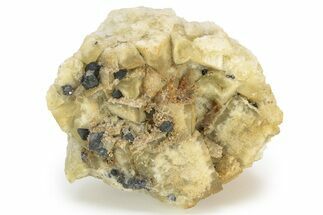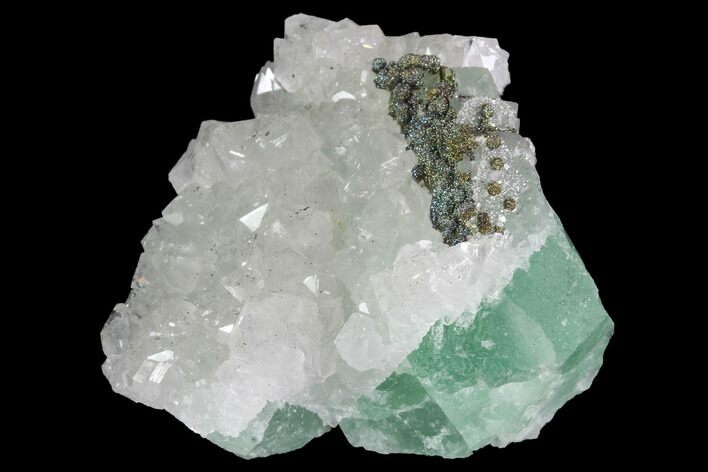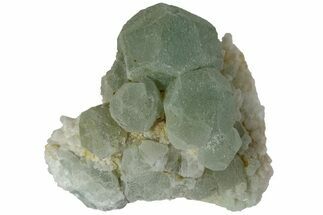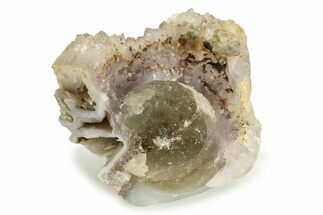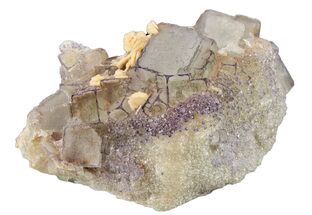This Specimen has been sold.
1.8" Quartz, Fluorite and Iridescent Pyrite Association - Fluorescent
This small specimen contains quartz, green fluorite and iridescent pyrite druze. The quartz makes up the majority of this specimen. The quartz formed from green fluorite which peaks out from one side of the specimen. They pyrite formed in druzy fashion and displays an extremely beautiful iridescence.
Under short and long-wave UV lighting, the fluorite fluoresces i vibrant blue/purple color.
Under short and long-wave UV lighting, the fluorite fluoresces i vibrant blue/purple color.
About Fluorite
Fluorite is a halide mineral comprised of calcium and fluorine, CaF2. The word fluorite is from the Latin fluo-, which means "to flow". In 1852 fluorite gave its name to the phenomenon known as fluorescence, or the property of fluorite to glow a different color depending upon the bandwidth of the ultraviolet light it is exposed to. Fluorite occurs commonly in cubic, octahedral, and dodecahedral crystals in many different colors. These colors range from colorless and completely transparent to yellow, green, blue, purple, pink, or black. Purples and greens tend to be the most common colors seen, and colorless, pink, and black are the rarest.
Fluorite is a halide mineral comprised of calcium and fluorine, CaF2. The word fluorite is from the Latin fluo-, which means "to flow". In 1852 fluorite gave its name to the phenomenon known as fluorescence, or the property of fluorite to glow a different color depending upon the bandwidth of the ultraviolet light it is exposed to. Fluorite occurs commonly in cubic, octahedral, and dodecahedral crystals in many different colors. These colors range from colorless and completely transparent to yellow, green, blue, purple, pink, or black. Purples and greens tend to be the most common colors seen, and colorless, pink, and black are the rarest.
About Quartz
Quartz is the name given to silicon dioxide (SiO2) and is the second most abundant mineral in the Earth's crust. Quartz crystals generally grow in silica-rich environments--usually igneous rocks or hydrothermal environments like geothermal waters--at temperatures between 100°C and 450°C, and usually under very high pressure. In either case, crystals will precipitate as temperatures cool, just as ice gradually forms when water freezes. Quartz veins are formed when open fissures are filled with hot water during the closing stages of mountain formation: these veins can be hundreds of millions of years old.
Quartz is the name given to silicon dioxide (SiO2) and is the second most abundant mineral in the Earth's crust. Quartz crystals generally grow in silica-rich environments--usually igneous rocks or hydrothermal environments like geothermal waters--at temperatures between 100°C and 450°C, and usually under very high pressure. In either case, crystals will precipitate as temperatures cool, just as ice gradually forms when water freezes. Quartz veins are formed when open fissures are filled with hot water during the closing stages of mountain formation: these veins can be hundreds of millions of years old.
About Pyrite
The mineral pyrite, also known as iron pyrite, is commonly referred to as Fool's Gold because its metallic luster and pale brass-yellow hue give it a superficial resemblance to gold. In the old mining days, pyrite was sometimes mistaken for gold.
It is the most common of the sulfide minerals with the chemical formula FeS2. Pyrite crystals occur in many shapes and habits, including cubes of all sizes, penetration twin cubes, pyritohedral clusters and as small druzy crystals that can exhibit a beautiful glistening effect.
The mineral pyrite, also known as iron pyrite, is commonly referred to as Fool's Gold because its metallic luster and pale brass-yellow hue give it a superficial resemblance to gold. In the old mining days, pyrite was sometimes mistaken for gold.
It is the most common of the sulfide minerals with the chemical formula FeS2. Pyrite crystals occur in many shapes and habits, including cubes of all sizes, penetration twin cubes, pyritohedral clusters and as small druzy crystals that can exhibit a beautiful glistening effect.
SPECIES
Quartz, Fluorite & Pyrite
LOCATION
El Hammam, Meknès, Morocco
SIZE
1.8" wide
CATEGORY
ITEM
#92274
 Reviews
Reviews
